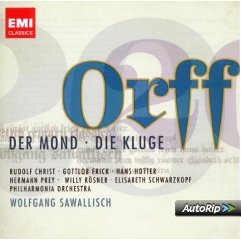Carl Orff – Der Mond 1957 (Sawallisch) [1998]
Carl Orff – Der Mond 1957 (Sawallisch) [1998]

1. Verzeiten gab es ein Land (Erzähler) 2:58 2. Was ist das für ein Licht? (Burschen/Bauer) 3:59 3. Tanz der Bauern in der Schenke (Orchestra) 1:58 4. Und wann ich hamwärts geh (Schultheiß/Bauernchor) 1:29 5. Der Mond ist fort (Chor/Kinderchor) 2:06 6. Wirt, Leute kommen! (Bauer/Wirt/Chor/Burschen) 1:20 7. Wenn ihr nachts aus der Taberne (Burschen/Chor/Wirt) 3:15 8. So hängt ihn auf (Wirt) 1:06 9. Seht den Mond (Chor/Burschen) 0:44 10. Und sie brachten den Geraubten glücklich in ihr Land (Erzähler) 1:05 11. Phantastische Nacht (Orchestra) 3:54 12. Die Vier versorgten den Mond mit Öl (Erzähler) 1:11 13. Lieg' ich hier an dieser Schwelle (Erster Bursche/Chor/Wirt) 3:27 14. Alle, die wir ringsum stehn (Chor) 1:48 15. Und als der "Erste" gestorben war (Erzähler) 3:21 16. Und als der Mond dort leuchtete (Erzähler/Chor/Burschen) 5:07 17. Du spielst, als lägst du noch im Grab (Kartenspieler/Würfler/Kegler/Säufer) 2:03 18. Florat silva undique (Chor/Mädel/Burschen) 2:55 19. Was ist da los? (Petrus/Chor/Burschen) 8:13 20. Tanz der Toten (Orchestra) 0:50 21. Der Wein ist gut (Petrus/Chor/Burschen) 1:22 22. Wie kalt ist's draußen in der Welt (Petrus) 0:53 23. Magischer Zauber (Orchestra) 1:17 24. Sitz ich da am hohen Himmel (Petrus/Chor der Toten) 9:10 25. So brachte Petrus die Toten zur Ruh (Erzähler) 1:48 26. Ach, da hängt ja der Mond! (Kleines Kind/Chor) 3:40 Rudolf Christ - Der Erzahler Karl Schmitt,Helmut Graml,Paul Kuen,Peter Lagger - Vier Burschen Albrecht Peter - Ein Bauer Hans Hotter - Petrus Philharmonia Chorus & Children's Chorus Philharmonia Orchestra Wolfgang Sawallisch - conductor
At about the same time that he premiered his most famous composition, Carmina Burana, Carl Orff was writing Der Mond, a one-act opera based on a traditional tale collected by the Grimm Brothers. The first scene is virtually a word-for-word setting of the opening of the Grimms' tale, including sung narration. It takes place in a time when the Moon was unknown; anyone who went out at night without their own lantern would have to feel their way around or run into things. Just after nightfall, four fellows from one town have traveled to a neighboring town. They see a strange light shining from the branches of a large oak tree. Like almost everyone else in the story, upon spying it they ask "What is that light, " and are told that it is "The Moon." Many years ago the man who is now the village mayor brought it home with him, having purchased it elsewhere. Now, he has put it in the tree, and regularly tops it off with oil for a nice weekly stipend. The four travelers steal The Moon and take it home. The villagers discover that their town is now in darkness, and berate the mayor for letting it go out. But when he is hoisted up into the branches, he discovers to everyone's horror that it has been stolen At home the travelers show off their Moon, sing a song describing its virtues, and make a good life-time deal for themselves. Time passes to mysterious music. As each of the travelers ages and dies in his turn, his will demands that his quarter of the moon be cut off from the light and taken with him. After the fourth traveler expires, the town is again in nightly darkness.
Not so in the vast underground crypts of the Dead. Once all four quarters of the moon are reunited, its light wakes the dead. Once they understand their situation, they delightedly turn to whatever gave them pleasure in life: drinking, gambling, bowling, etc. The noise of their revelry is even heard in Heaven where St. Peter at first fears another revolt by the forces of the underground. He stills the awakened souls by throwing a comet at them, then investigates the disorder. Upon discovering the situation, he gently bids them back to their slumbers and takes the Moon, hanging it in the heavens for the good of all the living. At the end, a little child is seen looking upward. "Oh, look, the Moon is shining, " he says, the only character in the play who understands it at first sight.
Orff's music is quite similar to that of Carmina Burana. There is the same emphasis on serving the words with clear, direct melodies, simple harmonies, bright orchestration, and strong yet simple rhythms. The interlude that depicts the passage of time and the deaths of the four travelers makes a different impression. Orff's music here is extraordinary, sounding like some of the mysterious nocturnal music from Mahler's Seventh Symphony: A pulsing low string figure suggests the turning of the vast clockwork of the cosmos; with it is a dark tuba solo and snarling muted brass chords. This extraordinary passage is unique in notation as well: it bears the unique key-signature of C-Flat Major, seven flats. Interestingly, it takes on a dark and mysterious quality in that key, rather than the bright sound commonly associated with B Major, which would be the usual spelling of this key. This attractive music should appeal to anyone who loves Carmina Burana for anything other than its erotic qualities. --- Joseph Stevenson, Rovi
download: uploaded yandex 4shared mediafire solidfiles mega filecloudio nornar ziddu
Last Updated (Wednesday, 05 March 2014 17:08)








